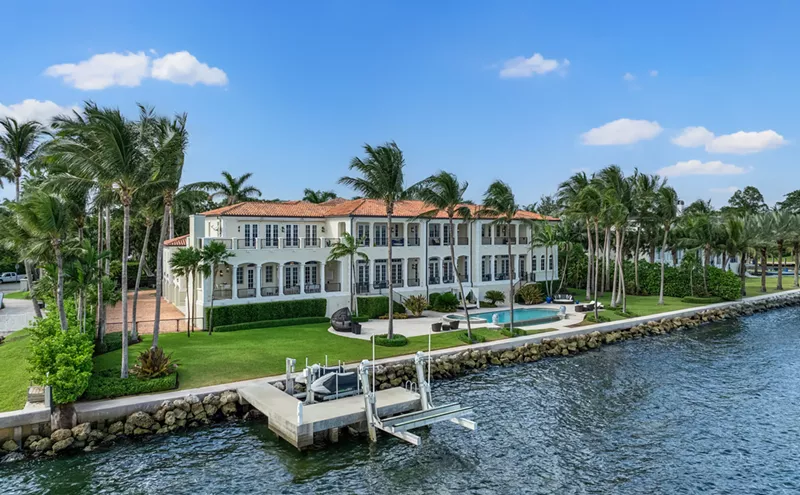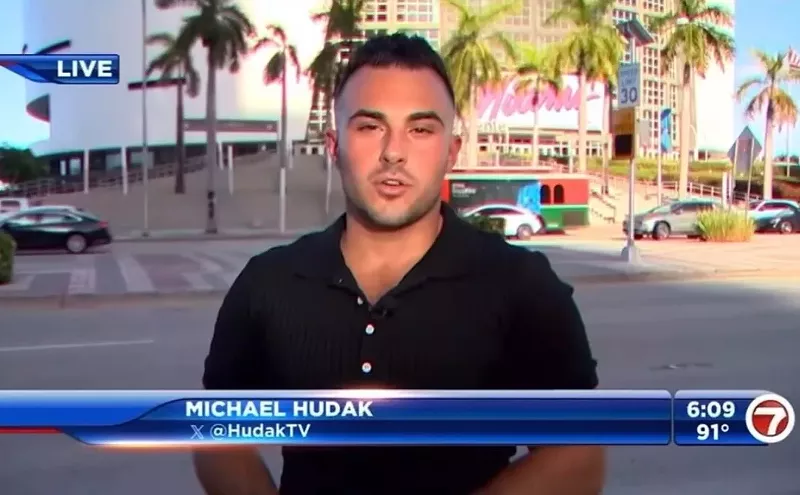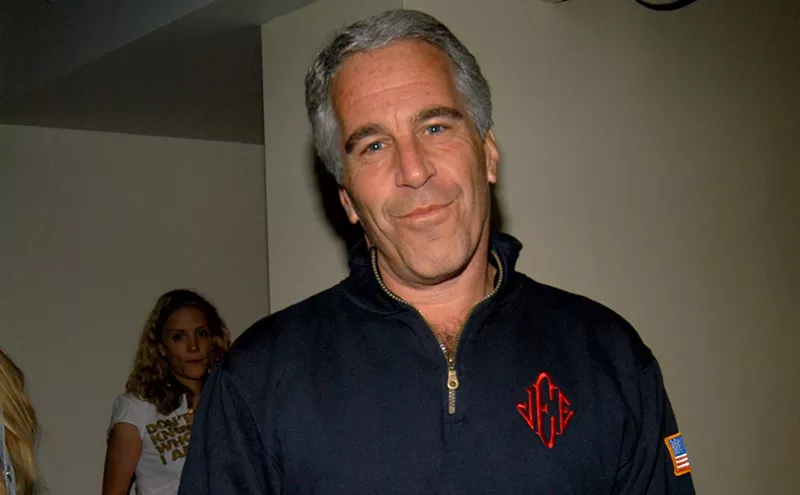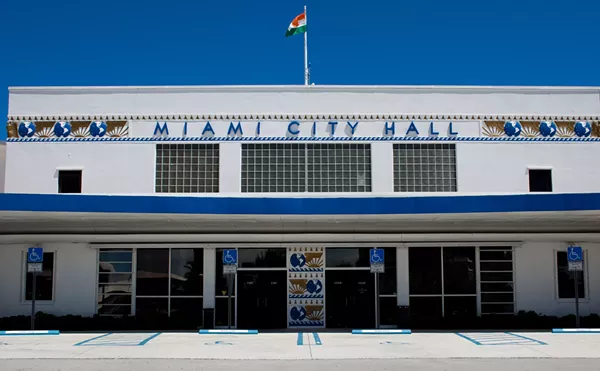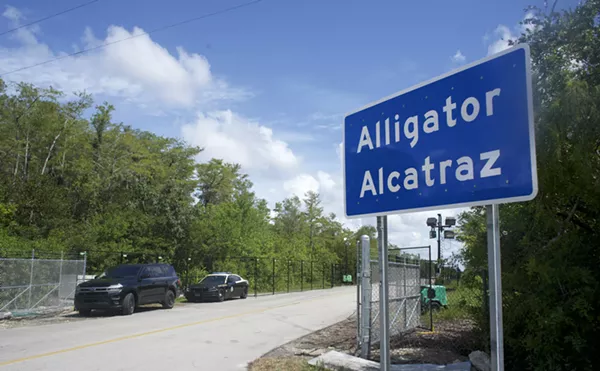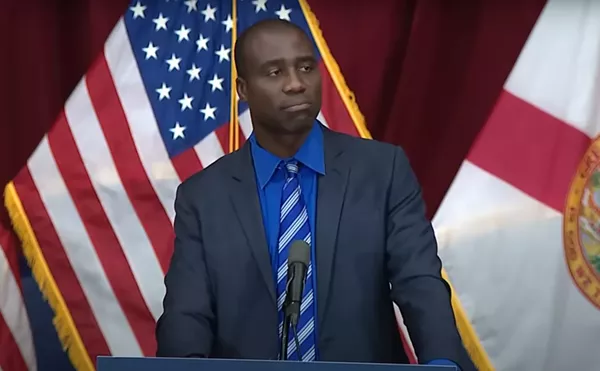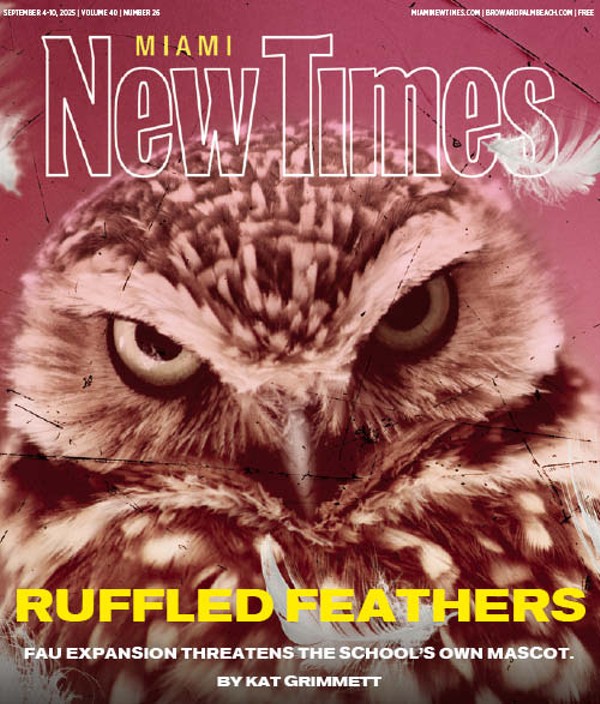The former state and federal prosecutors, who did not wish to be identified by name, believe the intricate deal, advanced by MDCC president Eduardo Padrón, could constitute fraud, official misconduct, bribery, and extortion -- should the real estate transaction be consummated in its present form. But simply planning the scheme, say the prosecutors, amounts to a conspiracy that could warrant criminal charges.
At the heart of the controversy is a provision in the proposed sales contract between MDCC and the Freedom Tower's owners -- the family of late Cuban-exile leader Jorge Mas Canosa. The contract says MDCC's purchase of the tower for $17 million is contingent upon the Mas family making a $2 million donation to the college. Should the Mas family fail to make the donation, the contract allows MDCC to take a two-million-dollar "credit" against the purchase price -- and that credit too would be recognized as a donation. (The college, in return, promised to memorialize the donation with a plaque or bust honoring Jorge Mas Canosa.)
A former Miami-based assistant U.S. Attorney, who is also expert in state law, says the proposed agreement could be evidence of official misconduct, a Florida felony punishable by up to five years in prison. "In a nutshell basically all [official misconduct] means is you falsify or cause another to falsify an official document, which would be your grant application [for state matching funds] and all kinds of other papers. Because really what you're doing is you're putting down that the sales price is 2X when in fact it's X. So they're creating a false document.
"I think you could probably also make a justifiable bribery case," he continues, quoting from the state statute. "Bribery means 'corruptly to request, solicit, accept, or agree to accept for himself, herself, or another, any pecuniary or other benefit with an intent or purpose to influence the performance of any act or omission ... in violation of a public duty, or in performance of a public duty.' Another doesn't have to be a person. It could be another entity -- that is, the college. If I'm the public servant, in order to influence you to sell it to me, you're going to have to pay another, i.e., the foundation here at the college. I can make an argument that that's a bribery case right there. Unusual? Yes. But it's in the ballpark."
Another former assistant U.S. Attorney says the donation provision of the sales contract may violate federal law as well. "You could create, on the federal side, an interesting extortion theory," he notes, "where they're basically saying, 'You pay me so I'll buy your building and you can get rid of your albatross of a building. But you'll also donate part of the proceeds to this library I want in my name -- or something like that." A critical issue, says this former prosecutor, is the matter of disclosure. "Were they going to disclose to the state the three million dollars or whatever the amount that was coming back in a donation?" he asks. "If they didn't disclose it, if they just said with a wink and a nod: 'Hey, we're going to raise the price and we'll get the money from the state and the state basically is going to pay for the library' -- then I'd have a problem with it."
A former assistant State Attorney, who now works for a Miami firm that investigates fraud, also sees potential criminal infractions. "It sounds to me like there's fraud, there's conspiracy, there's breach of duties," he says. "And those would be the simpler ones."
The possible criminal charges may be simple, but the circumstances from which they could arise are somewhat more complex. A June 19 New Times cover story ("Bad Man on Campus") described the events that led to Adis Vila being fired from her position as vice president of external affairs at Miami-Dade Community College. Vila's boss, MDCC president Eduardo Padrón, sacked her. For those familiar with Padrón's control over the college, her demise came as no surprise. Vila herself believes her termination was an act of retaliation and has filed a complaint under Florida's whistleblower law.
Vila, whose academic training and broad professional experience were hailed by Padrón when he hired her a year ago, had the audacity to challenge him in his quest to buy the Freedom Tower. Vila and other MDCC insiders were angered by Padrón's transfer earlier this year of $9.5 million from the college's Community Endowment fund to the independent MDCC Foundation, which raises money for the college. The $9.5 million would be used to attract state matching dollars for purchase of the building. Vila didn't object to the idea of MDCC expanding by adding the Freedom Tower to its downtown Wolfson Campus, but she did object to Padrón using Community Endowment funds for the purchase.
For years MDCC's own attorneys had advised the college not to spend endowment money on real estate. Why? Because the 1992 referendum passed by Miami-Dade County voters to establish the endowment stated that its purpose was "the maintenance, improvement, and expansion of occupational, vocational, and educational programs." Miami-Dade residents voted to tax themselves for MDCC programs, not property.
Another problem: The MDCC Foundation, which is a private, nonprofit corporation, accepts private donations. It is not designed to accept money from the college itself, much less restricted money from an endowment created by taxpayers.
Undaunted, Padrón took $9.5 million from the endowment and this past January transferred it to the foundation, where the taxpayer money instantly metamorphosed into a very large private donation, which then made it eligible for state matching funds. One member of an MDCC advisory committee, Juan Galan, was vexed by Padrón's legerdemain. "Can you explain to me how you leap from public taxes to private donations?" he asked E.H. Levering during a public meeting this past May. Levering, the college's vice provost for business affairs, was unable to offer an explanation. "You can't use state money [such as the endowment funds] to get state money," he acknowledged. "This is another one of those big legal issues."
Adis Vila was also vexed, and not just by the transfer of endowment money. She questioned other aspects of Padrón's strategy for purchasing the Freedom Tower as well, her concerns ranging from possibly unethical to potentially illegal actions. Her reward for such candor was termination. Vila, however, did not go quietly. In April, a month after being fired, she distributed to the MDCC board of trustees a six-page memorandum detailing her misgivings about Padrón, the Freedom Tower deal, and a host of other matters. Among her allegations: Padrón and his top assistants misled state officials regarding the Community Endowment funds, and may have violated state laws governing competitive bidding.
Vila's most serious allegation, however, concerned a December 18, 2002, meeting of the MDCC board of trustees' real estate committee. Two college trustees are on the committee: Hank Klein, head of the commercial brokerage division at the Codina Group, and real estate lawyer Armando Bucelo. Others at the meeting, which took place at Bucelo's law office in Coral Gables, included Padrón, Vila, vice provost for facilities Chris Moran, legislative analyst Maggie Manrara, college attorney Fleta Stamen, and lawyer Rene Murai, whom the college hired to negotiate the Freedom Tower purchase.
According to Vila, at this meeting Padrón and others discussed the possibility of the college paying an "inflated" price for the tower. In exchange the Mas family would make a donation to the MDCC Foundation. According to Vila, the term "kickback donation" was used to describe the contribution. She says she told the participants such a transaction would be "inappropriate."
Another meeting participant, who requested anonymity for fear of retaliation, confirms that Vila raised objections: "We both said that we had to first make the deal to buy the property, and if [the sellers] wanted to make a donation, that's a different issue. We could not make a purchase tied to a donation."
The meeting was not tape-recorded, though Padrón took notes and later prepared minutes. But those minutes do not include any mention of concerns regarding a donation from the Mas family. Padrón insists that's because Vila never raised any concerns. In a June 24 interview with New Times, he described Vila as a "disgruntled employee" who was miffed because "she wanted all the glory" associated with the Freedom Tower purchase. (Through a private attorney, Padrón declined subsequent requests for comment.)
Attorney Rene Murai emphatically denies there was any discussion of paying an "inflated" price in exchange for a "kickback" donation. "Oh, God. Gosh, no," he says. Hank Klein will not discuss Vila's assertion that she expressed concerns regarding a Mas family donation. "I don't want to get into all that," he says. Armando Bucelo did not respond to a request for comment about the donation.
Months later Vila remains indignant: "How would you explain to anybody that you were willing to pay more than what the appraised value of the building is worth, and then have it come back as a kickback? You just can't do that kind of stuff."
Notwithstanding the dispute over who said what, the results were unambiguous. In a draft of the sales contract distributed by Murai, the terms are clearly spelled out: MDCC would pay $17 million for the Freedom Tower and the Mas family would make a $2 million donation. "In order to induce Purchaser to enter into this Agreement and as a condition to Purchaser's obligations hereunder, Seller has agreed that it or its Affiliates will make an in-cash donation to Purchaser in the sum of Two Million Dollars ... at or prior to Closing," the contract states. "In the event Seller fails to comply with the foregoing obligation, Purchaser shall be entitled to a credit at Closing against the payment of the Purchase Price in the sum of Two Million Dollars, which credit shall constitute a donation by Seller to the Purchaser."
University of Miami law professor Anthony V. Alfieri, director and founder of the school's Center for Ethics & Public Service, believes the contract could be legal, but he still has qualms. "As a matter of formal contract law, the [MDCC] transaction may be lawful and enforceable," he says. "At the same time, to the extent that a public entity is party to the contract and may appear to have intentionally steered a contract to a prospective donor, the contract may be against public policy in that it casts favor on individuals based on their willingness or ability to donate. That form of discrimination is troubling."
Bob Jarvis, an ethics professor at Nova Southeastern University's law school, also has doubts about the contract. "If at the end of the day the college is paying more than the building is worth, then obviously there's a problem," he says. "The argument would be that the college president and the trustees have not fulfilled their fiduciary duty. The real question is why the deal is being structured this way. This looks very strange. There may be a good explanation, I just can't think of it."
The former state prosecutor who now investigates fraud is less equivocal about the contract's donation provision. "This is clearly more fleshing out of the conspiracy that was going on," he says. "If I were trying to put [a case] together, I'd probably be running down the conspiracy lines. It just looks to me like someone is trying to make a quiet little deal happen and then: 'Oh, by the way, we scam the state for two million dollars.' You're potentially misusing the public trust in tax dollars to the tune of two million dollars."
The former Miami-based federal prosecutor who perceived official misconduct and bribery sees another potential complication, this one involving the Internal Revenue Service. "If that [sales transaction] happened," he says, "and either the Mas family or one of the Mas foundations or companies made a charitable deduction and took a tax break, that could be federal tax fraud, because it literally wouldn't be a legitimate charitable deduction." (Neither the Mas family nor their attorney responded to requests for comment.)
Today the Freedom Tower's fate remains unsettled. Faced with a severe budget crunch, the state legislature in May turned down MDCC's request for $9.5 million in matching funds to purchase the building, despite endorsements from the state Department of Education and support from members of the Miami-Dade legislative delegation.
But there's always next year.



